Magnetic Coating Thickness Gauge
26741 आईएनआर/टुकड़ा
उत्पाद विवरण:
- उपयोग Industrial
- वज़न ग्राम (g)
- रंग Grey
- डिसप्ले Digital
- प्रॉडक्ट टाइप Magnetic Coating Thickness Gauge
- मटेरियल Steel
- अधिक देखने के लिए क्लिक करें
X
मूल्य और मात्रा
- 1
उत्पाद की विशेषताएं
- Digital
- Steel
- Magnetic Coating Thickness Gauge
- ग्राम (g)
- Grey
- Industrial
व्यापार सूचना
- प्रति सप्ताह
- हफ़्ता
उत्पाद वर्णन
A magnetic coating thickness gauge, also known as a magnetic thickness gauge or magnetic pull-off thickness gauge, is a device used to measure the thickness of non-magnetic coatings on magnetic substrates. It works on the principle of magnetic attraction or repulsion.
We are a well-renowned organization in the industry to provide our patrons the best quality array of Magnetic Coating Thickness Gauge.
Heres how it typically works:
1. Principle: When a magnetic probe is placed on the coating, it adheres to the substrate due to magnetic attraction. The thickness of the coating affects the distance between the probe and the substrate, altering the magnetic force.
2. Measurement: The gauge measures this magnetic force and converts it into a coating thickness reading. Thicker coatings will result in weaker magnetic forces, while thinner coatings will result in stronger magnetic forces.
3. Calibration: Before use, the gauge needs to be calibrated using samples with known coating thicknesses. This calibration ensures accurate measurements.
4. Operation: To measure the coating thickness, the gauge is placed on the coated surface. The gauge is then pulled away from the surface either manually or with the help of a spring-loaded mechanism. The point at which the gauge releases from the surface corresponds to the thickness of the coating.
5. Readout: The gauge typically has a scale or a digital display that shows the coating thickness in units such as micrometers or mils (1 mil = 0.001 inches).
Magnetic Coating Thickness Gauge Applications:
1. Automotive Industry: Magnetic coating thickness gauges are used to ensure the quality and durability of paint coatings on automotive bodies and parts. Proper paint thickness helps prevent corrosion and ensures aesthetic appeal.
2. Aerospace Industry: Coatings on aircraft components need to meet strict standards for safety and performance. Magnetic coating thickness gauges are used to measure the thickness of protective coatings on aircraft surfaces and components, including fuselage, wings, and engine parts.
3. Marine Industry: In marine environments, coatings play a crucial role in protecting ships and offshore structures from corrosion due to exposure to saltwater and harsh weather conditions. Magnetic coating thickness gauges are used to assess the integrity of anti-corrosion coatings on ship hulls, decks, and offshore platforms.
4. Construction Industry: Coatings on structural steel elements in buildings and infrastructure need to meet design specifications and durability requirements. Magnetic coating thickness gauges are used to measure the thickness of coatings on steel beams, columns, and other structural components.
5. Metal Fabrication: Manufacturers of metal products use magnetic coating thickness gauges to ensure the quality and consistency of coatings applied to metal sheets, pipes, tanks, and other fabricated components.
6. Industrial Manufacturing: Magnetic coating thickness gauges are used in various industrial manufacturing processes where coatings are applied to metal substrates for corrosion protection, surface finishing, or functional purposes.
7. Quality Control and Inspection: Magnetic coating thickness gauges are essential tools for quality control and inspection processes in industries where coating thickness is a critical parameter. They help ensure that coatings meet specified thickness requirements and adhere properly to the substrate.
8. Corrosion Protection: Coatings play a vital role in protecting metal substrates from corrosion. Magnetic coating thickness gauges are used to monitor the condition of protective coatings over time and assess the need for maintenance or recoating to prevent corrosion-related damage.
9. Surface Preparation: Magnetic coating thickness gauges are also used to assess the effectiveness of surface preparation methods such as abrasive blasting or chemical cleaning before coating application. Proper surface preparation is essential for ensuring coating adhesion and performance.
Magnetic Coating Thickness Gauge FAQ:
Q. What is a magnetic coating thickness gauge used for?
Ans: A magnetic coating thickness gauge is used to measure the thickness of non-magnetic coatings, such as paint, enamel, or plating, on magnetic substrates like steel or iron.
Q. How does a magnetic coating thickness gauge work?
Ans: These gauges work on the principle of magnetic attraction or repulsion. When placed on the coating, the gauge adheres to the substrate due to magnetic force. The thickness of the coating affects the magnetic force, which is measured and converted into a coating thickness reading.
Q. What types of coatings can be measured with a magnetic coating thickness gauge?
Ans: Magnetic coating thickness gauges are suitable for measuring non-magnetic coatings on magnetic substrates. This includes coatings like paint, varnish, enamel, chrome, and galvanizing.
Q. How accurate are magnetic coating thickness gauges?
Ans: The accuracy of these gauges depends on various factors including the quality of the gauge, proper calibration, surface preparation, and the type of substrate and coating being measured. Generally, high-quality gauges can provide accurate measurements within a certain tolerance range.
Q. How is a magnetic coating thickness gauge calibrated?
Ans: Calibration involves setting the gauge to read accurately by comparing its measurements to known standards. Calibration is typically done using certified calibration standards or reference samples with known coating thicknesses. This ensures the accuracy of the gauges readings.
Q. What are the advantages of using a magnetic coating thickness gauge?
Ans: Some advantages include:
- Quick and easy measurements.
- Non-destructive testing.
- Suitable for on-site inspections.
- Can measure coating thicknesses ranging from micrometers to millimeters.
Q. Are there any limitations or considerations when using magnetic coating thickness gauges?
Ans: Yes, some considerations include:
- They are only suitable for measuring non-magnetic coatings on magnetic substrates.
- Surface roughness and curvature can affect measurements.
- Proper calibration and technique are crucial for accurate results.
- Some coatings may require specific probe designs for accurate measurements.
Q. What industries commonly use magnetic coating thickness gauges?
Ans: Industries such as automotive, aerospace, marine, construction, metal fabrication, and industrial manufacturing commonly use these gauges for quality control, corrosion protection assessment, and compliance with specifications.
Q. Can magnetic coating thickness gauges measure multiple layers of coatings?
Ans: Yes, some advanced models can measure the total thickness of multiple layers of coatings. These gauges typically have settings or modes to differentiate between individual layer thicknesses and total thickness.
Q: What is the usage of the Magnetic Coating Thickness Gauge?
Ans: This device is used in industrial settings.
Q: How much does the Magnetic Coating Thickness Gauge weigh?
Ans: It weighs 230 grams (g).
Q: What is the color of the Magnetic Coating Thickness Gauge?
Ans: The color of this product is grey.
Q: What is the material of the Magnetic Coating Thickness Gauge?
Ans: The Magnetic Coating Thickness Gauge is made of steel.
Q: What type of display does the Magnetic Coating Thickness Gauge have?
Ans: It has a digital display.
Tell us about your requirement

Price: Â
Quantity
Select Unit
- 50
- 100
- 200
- 250
- 500
- 1000+
Additional detail
मोबाइल number
Email
 English
English Spanish
Spanish French
French German
German Italian
Italian Chinese (Simplified)
Chinese (Simplified) Japanese
Japanese Korean
Korean Arabic
Arabic Portuguese
Portuguese
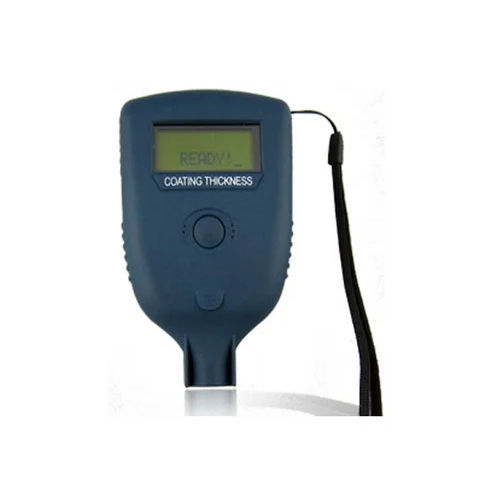

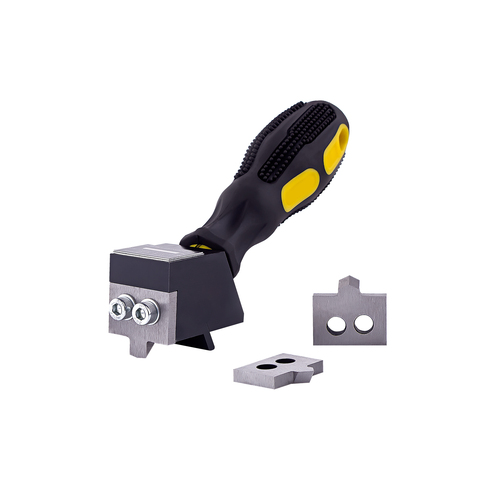
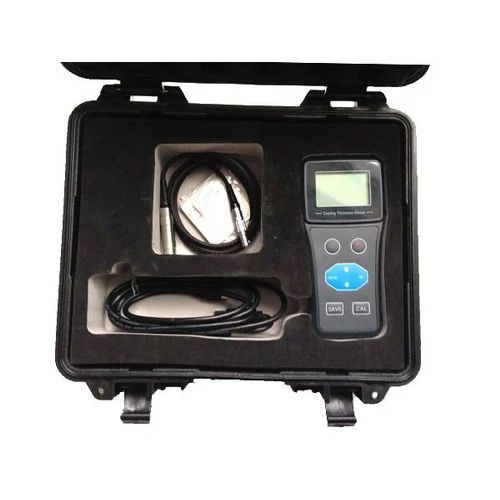
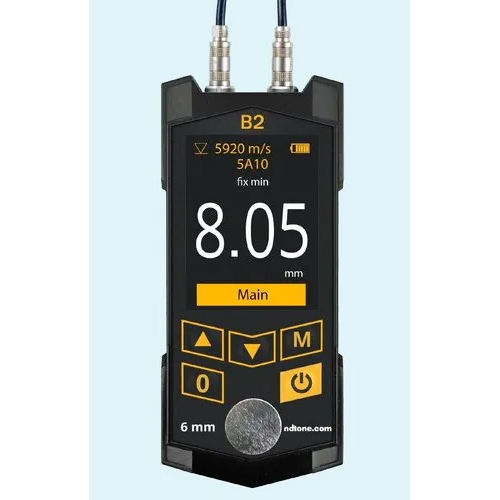
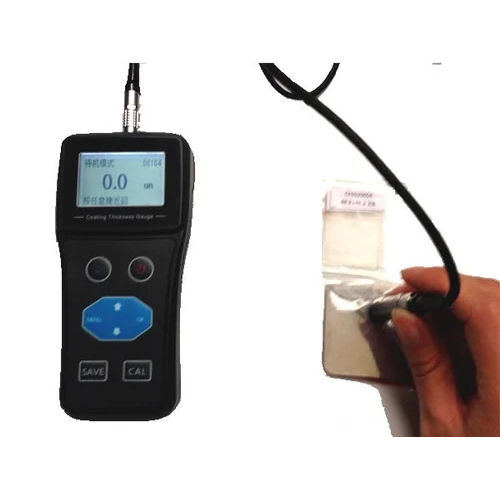
 मुझे निःशुल्क कॉल करें
मुझे निःशुल्क कॉल करें
